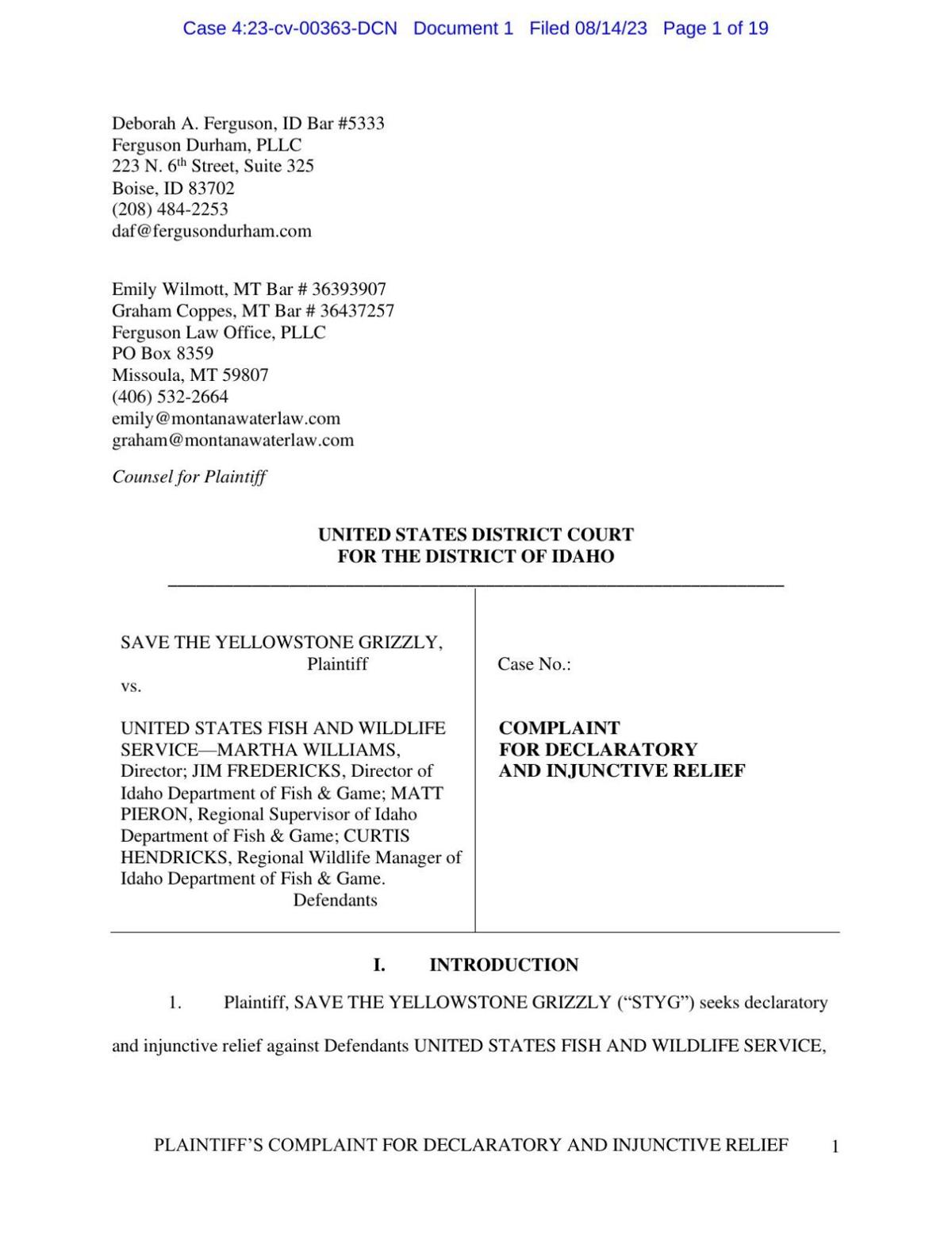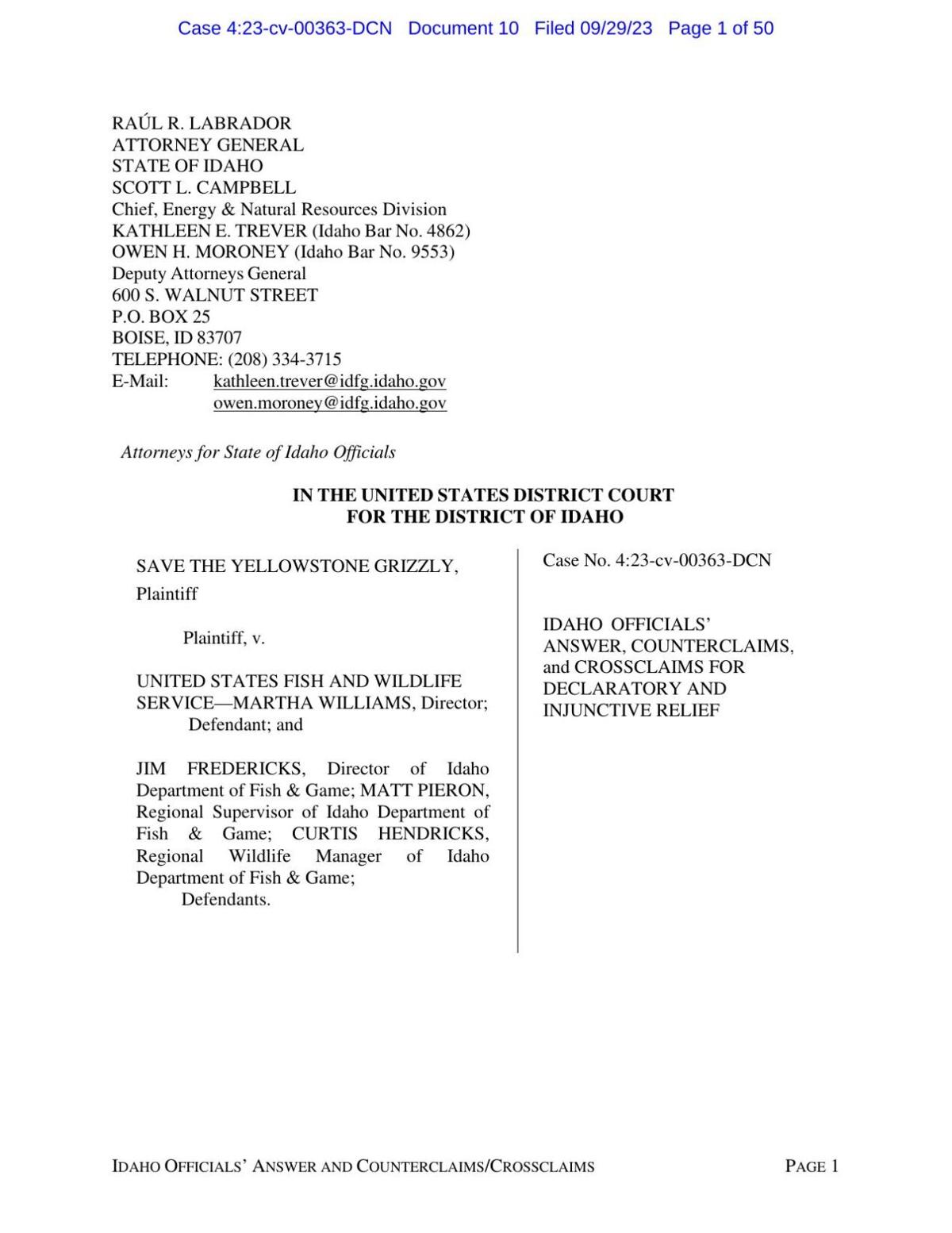Grizzly Advocacy Group Sues Idaho, Feds Over Tetonia Bears' Killing

Because the federal agencies are in a state of perpetual paralysis due to perversities such as that described below, it is essential that Western states gain control of wildlife and forest management, including grizzly bear management.
NOTE: this article was originally published to JHNewsandGuide.com on October 11, 2023. It was written by Billy Arnold.
In response, Idaho is making the case into a fight over grizzly management in general.
A grizzly advocacy group is suing the State of Idaho and the federal government for the killing of three grizzly bears in Tetonia, Idaho, in 2021, which the group says happened in violation of the Endangered Species Act.
Idaho does admit that Idaho Fish and Game Department officials killed the grizzlies despite concerns raised by the U.S. Fish and Wildlife Service, which manages species protected under the Endangered Species Act. But the state has denied any allegation of wrongdoing.
In its defense, the State of Idaho is asking a judge to force the Fish and Wildlife Service to reconsider its petition to remove grizzly bears’ protections in the lower 48 states. Idaho attorneys also are asking a judge to rule that, in certain cases, states do not need federal approval to kill individual grizzlies.
In a nutshell, the state is turning a suit about three grizzlies into a suit about managing grizzlies generally, which could potentially upset at least one longstanding paradigm of grizzly management in the West. The U.S. Fish and Wildlife Service has not yet filed a response in the case.
The bears in question were a grizzly sow and her two cubs, which had been relocated from Gardiner, Montana, to a West Yellowstone campground earlier that year. They later migrated to the Tetonia area, where they were shot and killed by Idaho Fish and Game officials, prompting an outcry from Teton Valley wildlife advocates.
Save the Yellowstone Grizzly says the bears did not present an immediate threat to humans.
“Neither Grizzly 1089 nor either of her cubs demonstrated any threat to human safety at any time or committed a single known depredation upon livestock, crops or beehives,” attorneys wrote in the group’s suit. “The bears were foraging in proximity to human residences without a single reported conflict.”
But Idaho says the bears did pose a safety risk, in part because they had not responded to hazing in Gardiner, in part because they were not moving toward a den site away from human development, and in part because of “potential encounters” between the bears, people, their children and pets.
“There was at least one charge by the adult female involving a dog, and other dangerous situations involving residents or their animals were reported or observed by Idaho staff,” Idaho attorneys wrote in their response.
Save the Yellowstone Grizzly and Idaho agree that the U.S. Fish and Wildlife Service was uneasy with the state’s plan to kill bears, rather than relocate them. But the bear advocates also contend that the Fish and Wildlife Service improperly gave the state approval to kill the grizzly sow and its first cub, and that the state acted without federal approval when it killed the second cub a day later. Idaho denies those allegations.
The state also has broadened the case, filing a cross-claim — essentially a lawsuit of its own — against the Fish and Wildlife Service for continuing to list grizzly bears as “threatened” in the lower 48 states. This spring, the Fish and Wildlife Service said Idaho’s petition to remove those protections did not warrant further consideration.
Idaho is asking a judge to declare that determination “arbitrary, capricious, an abuse of discretion, not in accordance with the law, and otherwise contrary to constitutional rights and powers.” The state wants a judge to remand the decision to the feds for reconsideration.
This spring, the feds did grant that Wyoming’s and Montana’s petitions to remove federal protections for grizzlies “may” be warranted. Wyoming asked the Fish and Wildlife Service to remove protections for grizzly bears in the Greater Yellowstone Ecosystem, which surrounds Yellowstone National Park. Montana asked to do the same in the Northern Continental Divide Ecosystem, which surrounds Glacier National Park.
In the coming months, the Fish and Wildlife Service is expected to decide whether to delist those bears.
The core of the argument between Save the Yellowstone Grizzly and State of Idaho is over what grizzly management rules apply where.
The advocacy group points to federal rules that prohibit everyday people and state game officials from killing a grizzly bear unless the bear is preying on livestock, crops or beehives or constitutes as “demonstrable but non-immediate threat to human safety.” Grizzlies only can be killed, in Save the Yellowstone’s interpretation of the law, if it isn’t possible to relocate the bear and if the bear is killed following interagency guidelines.
The State of Idaho says that Save the Yellowstone Grizzly improperly is applying that law. Idaho says the federal rule bear advocates are highlighting applies only to federal lands, not private, state or tribal land. Idaho also is asking a judge to rule that the state does not need federal approval to kill grizzlies.
The state’s attorneys point to part of the law in dispute, arguing it gives states authority to kill grizzlies if certain conditions are met — and without “bear-specific” approval from the Fish and Wildlife Service. That issue is likely to be hotly litigated, considering a longstanding grizzly management paradigm that says state wildlife managers are required to consult with the Fish and Wildlife Service before killing a grizzly.
In emails cited in Save the Yellowstone Grizzly’s suit, Matt Hogan, the Fish and Wildlife Service’s regional director for the mountain-prairie region, asked Hilary Cooley, the agency’s grizzly bear recovery coordinator, whether a state had “ever removed a bear without approval.”
Cooley responded, “Not that I’m aware of.”
In response, Idaho said it was unaware of the emails between Hogan and Cooley and “denies them on that basis.” The state also argued it was authorized to kill the bears, and that it followed federal law in doing so.
—
For more posts like this, in your inbox weekly – sign up for the Restoring Diversity Newsletter


